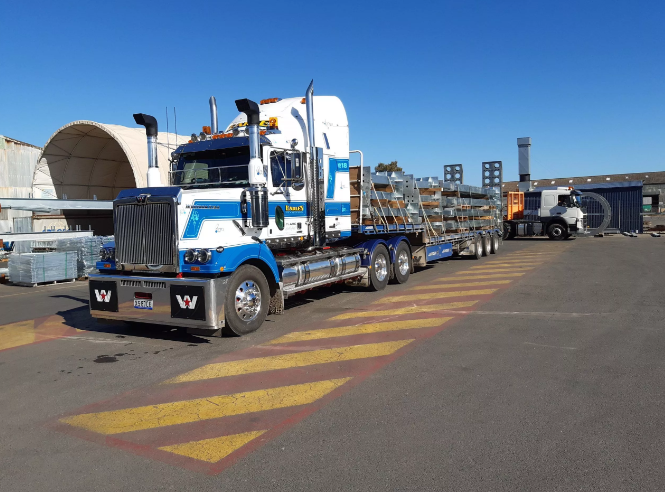Freight Transport: A Global Industry with a Local Impact
From the delivery of everyday products to the movement of raw materials for manufacturing, the freight transport industry serves as the lifeblood of global trade. It is a complex and interconnected web of logistics that ensures goods reach their intended destinations efficiently. However, beyond its global reach, it also leaves a lasting impact locally, particularly in countries like Australia.
The vital link of transport brings goods to local businesses and households, fueling economic growth and supporting domestic industries. Furthermore, Australia's reliance on international trade and exports necessitates a robust and efficient freight transport network, enabling businesses to reach global markets.

The local impact of this transport industry goes beyond economics. It affects communities by creating employment opportunities, shaping infrastructure development, and even influencing environmental sustainability. As such, understanding the intricate dynamics of this industry and its local implications is crucial to comprehend its significance in the broader context of global trade.
In this blog post, we will delve into the various aspects of this industry, explore its role in Australia, and highlight its profound local impact and global reach.
Impact of freight transport on the global industry
The freight transport system's smooth functioning is essential for global trade's success. It enables the movement of various types of goods, including raw materials, components, and finished products, across vast distances and diverse terrains. The industry ensures that supply chains remain robust and interconnected by providing efficient and reliable transportation services. Businesses heavily rely on the seamless flow of goods to access global markets and meet the demands of consumers worldwide. Whether it's the delivery of perishable goods to international markets or transporting components for manufacturing processes, timely and secure freight movement is crucial for businesses to stay competitive.
Getting a telehandler for hire can have an impact on the whole global industry in the following ways:
1. Key Modes of Freight Transport:
In Australia, as in many other countries, freight is transported through various modes, each playing a unique role in logistics.
- Road Transport: Road freight transport dominates the domestic market, delivering goods to local businesses and consumers. It offers flexibility, door-to-door service, and the ability to reach remote areas efficiently.
- Rail Transport: Rail freight links major cities and ports, handling large cargo volumes and reducing road congestion. It offers a cost-effective and environmentally friendly alternative for long-haul transportation.
- Maritime Transport: With its extensive coastline, Australia heavily relies on maritime transport for international trade. Ports serve as gateways for imports and exports, connecting the country to global markets and enabling the flow of goods across continents.
- Air Transport: Air freight is essential for time-sensitive and high-value goods, providing rapid long-distance delivery. It is critical to connect Australia to international markets and support industries such as e-commerce and perishable goods.
2. Economic Impact:
The freight transport industry has a significant economic impact locally and nationally. It contributes to job creation, infrastructure development, and trade growth in Australia. Efficient freight transport systems enhance competitiveness, attract investment, and foster economic prosperity by connecting businesses to global opportunities.
3. Environmental Considerations:
While freight transport plays a crucial role in economic development, it also poses environmental challenges. The industry's reliance on fossil fuels and associated greenhouse gas emissions contribute to climate change. To address these concerns, efforts are being made to promote sustainable practises such as utilising cleaner fuels, optimising routes, and embracing alternative transportation modes like rail and coastal shipping.
4. Supply Chain Resilience:
During the COVID-19 pandemic, we learned how important it is to have robust supply systems. Freight transport systems had to adapt swiftly to disruptions, ensuring the continuous flow of essential goods and medical supplies. Governments and businesses are now focused on enhancing supply chain resilience, investing in technologies, and fostering collaboration to mitigate future risks and maintain seamless operations.
5. Technological Advancements:
Technology plays a transformative role in this industry. Innovations such as automation, the Internet of Things (IoT), and blockchain are revolutionising logistics operations, improving efficiency, visibility, and security. Embracing these advancements enables smoother operations, real-time tracking, and streamlined communication throughout the supply chain.
Conclusion:
The freight transport industry is dynamic, connecting nations, supporting trade, and fueling economic growth. In Australia, it plays a crucial role in the domestic and international movement of goods, fostering local industries and enabling global trade partnerships. Adopting sustainable practises and utilising technical breakthroughs will be essential as the business develops in order to address the difficulties of a world that is changing quickly. We may endeavour to create a robust, effective, and sustainable logistics network in the future by being aware of the regional and global effects of freight movement.
For more information, visit Earles Transport.
